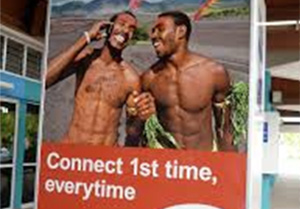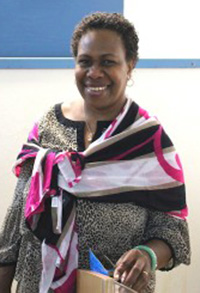
Jaleesa Simpson and Emma Clarke
PORT VILA (QUT News / Pacific Media Watch): Media workers in Vanuatu say they are upsetting the usual story of a small developing country, by getting more freedom of information, not less – though it has never been easy.
With more than 80 islands comprising that Pacific state, independent since 1980, the media industry is needing to work on creative and cost effective ways to broaden their reach to as much of the population as possible.
Reporting and distribution mean expensive, patient work. With a population of 250,000, 70 percent of Vanuatu’s citizens are living in isolated communities, hard to communicate with.
Only half of the population is concentrated on the main island of Efate.
With a small population and per capita GDP of A$3334, the media outlets rely on sponsors they can find to cover the costs of running a business, putting the journalists in some danger of falling under heavy influence or control.
Keeping the media independent
The Vanuatu Independent is a weekly newspaper based in Port Vila, with a weekly reach of 1500 readers, run on good will — something like a charitable organisation. The deputy editor, Evelyne Toa, says the majority of stories published in the newspaper are driven by a need to be “objective not sensational”, more so than other, larger media outlets.
The deputy editor, Evelyne Toa, says the majority of stories published in the newspaper are driven by a need to be “objective not sensational”, more so than other, larger media outlets.
“We’re not controlled by the government or owners on what we publish, because we believe in the right for our own people to be informed,” she says. “Our aim is to be informative and educational.”
To reach as much of the population as possible, the paper is published in the “pidgin” tongue Bislama, English, and French, and copies are flown out to the smaller islands, (mainly to schools, helped by the ANZ Bank).
Toa is also president of the Media Association of Vanuatu, and says that body also stands for being able to tell both sides of a story and not being hindered at all by financial backers.
Days of 'bullying' the media
She tells a story of how politicians in the earlier years of independence would try to interfere and dominate, but that has changed, and the government is now bringing in a Right to Information Bill, bound to open things up even more.
“If they don’t want to go through with it we will just tell people, and that will change them," she says.
“It is the same as when we had one minister who would come in and bang his fists on that desk, and if they do that we will tell the people to make them stop.
“Working in radio in the 1990s, the government would call up every morning asking what the headline was,” she said.
“Now we have more freedom, but we must also be responsible with actions and reporting.
“We tell our members to abide by the code of conduct when reporting.
“Our newspaper is a professional newspaper; we show both sides of the story. As long as we do, there’s no problem.”
Vanuatu is home to three newspapers, three radio stations, and one television station. Of these six outlets, the television station and one radio station are owned by the government.
Reporting on corruption
The Vanuatu Daily Post is a Port Vila-based newspaper that reaches 5000 readers six days a week.
The paper’s editor, Royson Willie, says the “government controls what their radio and television stations put out”, but tends to agree, more cautiously, with Evelyne Toa that much of the heat is coming off.
Willie says that the Vanuatu Post was part of the Commonwealth Press Association, the Media Association of Vanuatu, and the Pacific News Service, all to help ensure it was not controlled by "higher authority".
That allowed the paper to report on corruption within the government, though there had been the infamous incident of March 2011, in which a previous editor (who is the owner and publisher) was bashed in the company office.
A minister in the government was involved in that incident, escaping on some reduced charges; and Vanuatu appeared on international lists of countries where the press was abused (e.g. with Reporters Sans Frontieres).
“We launched a court case but the Public Prosecution lessened the charges to a small fine and nothing came of the case.
“They don’t want to reveal political issues or corruption, and there are a lot in Vanuatu.
“It’s all a sign of corruption in politics.
“It doesn’t happen a lot now, but in the old days when a politician was not happy with a story they just walked in swearing and shouting,” he says.
Think-tank line on reforms
The cost of running media outlets is not only causing journalists to be reliant on sponsors, but resulting in less of a reach - due to the newspapers having to bear the cost of flying papers out to smaller islands; the cost to consumers of television access by satellite; and lack of internet access on most islands.
The Pacific Institute of Public Policy was established to distribute information about Pacific issues; again seeking to present a balanced array of facts and commentary with no bias – to stimulate and inform debates on democracy and independence for the new states of the region.
Derek Brien, the executive director of the PIPP, understands the problems that news media have in spreading their messages.
“One of the biggest disconnects and hardest things with nation building is the large rural areas,” he said. “Some of the key stumbling blocks for national conversation is with those from the outside looking it.”
Brien says that working with government was difficult because barriers would be put in place to stop the flow of information; although, he agrees, such blockades are now no longer so much in place.
It was permitting a better, more informed debate, and more than that, it was interesting to see what would happen now that the “Independence” generation of leaders was moving on, with usually well educated younger people coming along to succeed them.
New technology revolution– online and phones
Technology was also sustaining change.
“Political leaders were against social media originally, but now they find the benefits of it and are engaging in it,” he says.
Ben Bohane, a photojournalist and communications director at the PIPP, says social media is changing the communications landscape.
“With the social media blowout, even countries have their own pages,” he says.
“It’s less regulated than newspapers, so anything that the government, or others want to say, can get out there.”
The roll out of mobile phone networks was revolutionising patterns of life and information, for example with people checking on the markets before committing to take their produce there; and some studies of spending patterns showed that most were earning more to meet the cost of the new facilities, not cutting into previous family income.
Online dialogues
“Before, those in power operated in a communication vacuum with less inclination to share. Now there are political actors, not necessarily MPs, on the scene, and the politicians see that it is beyond their control; they might not be part of the conversation”, says Derek Brien.
In common with editor Royson Willie at the Daily Post, he is impressed with the forthright dialogues going on, online, especially on the Bislama forum, “Straight-Talk”, Yumi Toktok Stret.
The PIPP was originally self-funded by its founders, including Brien, with the aim of keeping its work objective and free. Over the last few years the Australian government has come in as the core funder, and other governments are starting to fund the institute as well.
“We need a more diverse funding base,” he says.
As for pressure from the donors, “Apart from one occasion where we pushed back, our funders haven’t impacted on the information we’re making available.”
A traditional way of operating
Vanuatu is rich in culture and traditions which can have a perverse down-side at times. Uproar greeted a project for installing large water tanks, with vocal and destructive opposition from landholder groups against change that might alienate the customary use of land – and leave them with disappointing compensation.
There was concern that telephone towers and lines could be received the same way.
“The phone providers had discussions with traditional land owners to ensure they were happy with the phone infrastructure,” Brien says.
“The main concern that they had was how modern technology would be used in regards to traditional forms of communication.”
Telling stories
Such incidents underline the drive by agencies like the PIPP to explain their work at a public level.
“Everything we put out is in an accessible language to make sure everyone from the Prime Minister to the local plumber can understand the debate and actively take part in it,” says Ben Bohane.
“In this part of the world it’s all about communicating by telling stories. It’s about putting everything we do in fairly plain language so we are more widely positioned.
“We’ve got to be able to get a couple of key messages out there by telling these issues as stories, which results in getting more buy-in from locals.”
Activities include gathering and putting out facts on climate change and rising sea levels, a burning concern to many countries out in the Pacific Ocean, at times when major powers like China, India or the United States started moving away from it; support for education; and organising large gatherings at local level, where community members are able to talk with their parliamentarians.
Jaleesa Simpson and Emma Clarke are members of a Queensland University of Technology student journalism bureau team reporting on the Pacific. The team was based at the Pacific Media Centre in Auckland for a week.
This work is licensed under a Creative Commons Attribution-NonCommercial 3.0 New Zealand Licence.




